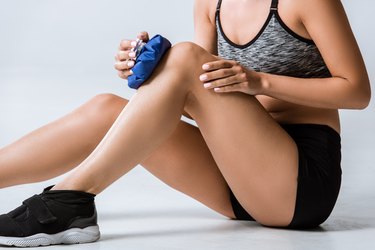
Whether you suddenly twisted your knee from a misstep or you wage a daily battle with arthritis, swelling can be painful and have you sidelined. But you can often ease mild to moderate swelling with a combination of home treatment and some simple lifestyle changes.
Knee Pain Relief After an Injury
Video of the Day
The standard TLC to ease swelling is known as RICE, which stands for rest, ice, compression and elevation, according to the American Academy of Orthopaedic Surgeons (AAOS). The secret is to do this immediately—don't wait.
Video of the Day
Step 1: Rest
To keep from making the swelling worse, you need to take all stress off the joint by getting off your feet. If you injured your knee during any type of activity, stop immediately. Stay off your feet as much as possible while you wait for the swelling to go down. Give sore knees a break!
Step 2: Ice
Cold helps reduce pain, inflammation and swelling. Grab an ice pack or, even better, a package of frozen vegetables like peas that will mold to the shape of your knee. Wrap the ice source in a towel to protect your skin, and place it on the affected knee for 20 minutes. Do this several times over the course of a few hours.
Step 3: Compression
Wrap your knee in an elastic or compression bandage or sleeve. This helps prevent further swelling and stabilizes the joint. The bandage should feel snug but not tight. If your toes begin to tingle or feel numb, remove the bandage and re-wrap it.
Step 4: Elevation
Position the affected knee so that it's higher than your heart. This helps get rid of fluid on the knee. Prop up your leg with pillows in bed or place it on the arm of your sofa when lying down.
Read more: Swelling of the Knee After Exercise
An over-the-counter anti-inflammatory drug, or NSAID, such as aspirin, naproxen or ibuprofen, will also help ease swelling and inflammation as well as bring knee pain relief, according to the AAOS. Be sure to follow dosage directions carefully because these drugs can cause side effects, especially from overuse or long-term use. Stop taking the medication when you have reached the maximum allowable amount. Never combine NSAIDs or take more than the recommended dosage.
Contact your doctor if the pain and swelling don't improve after a day or two. This could be a sign of a serious sprain, strain or contusion that could need physical therapy, prolonged rest or, if the damage is severe, even surgery. You might need an MRI or other imaging studies to assess ligaments, tendons and other soft tissues.
Warning: If your knee becomes warm and red, cannot bear any weight, feels numb or is misshapen, don't wait to get medical attention, according to the US National Library of Medicine.
Read more: How to Reduce Excess Fluid in the Knee
Chronic Knee Pain Relief
If your swollen knee pain is from a chronic condition like osteoarthritis, gout or an auto-immune disease like rheumatoid arthritis, chances are it's a recurring problem. RICE can help, but it should be just one part of your overall care plan.
Losing weight, if that's an issue, choosing low-impact exercise activities and strengthening thigh muscles to improve knee function should all help, according to the Mayo Clinic. A research review published in May 2019 in the journal Sports Medicine found that both cardio workouts and mind-body exercises, such as yoga and tai chi, can ease pain and improve function for arthritis in the knee as well as the hip.
And according to the American Massage Therapy Association, knee self-massage may help alleviate pain due to osteoarthritis of the knee.
Also be aware that a swollen knee first thing in the morning could be a sign of arthritis. If you start to experience this on a regular basis, especially if it comes with pain and stiffness, see your doctor for an evaluation, according to AAOS.
- Mayo Clinic: "Swollen Knee"
- US National Library of Medicine: "Knee Pain"
- American Academy of Orthopaedic Surgeons: “Arthritis of the Knee”
- American Academy of Orthopaedic Surgeons: “Sprains, Strains and Other Soft-Tissue Injuries”
- Sports Medicine: “Relative Efficacy of Different Exercises for Pain, Function, Performance and Quality of Life in Knee and Hip Osteoarthritis: Systematic Review and Network Meta-Analysis”
- American Massage Therapy Association: "Self-Massage For Knee Pain"
Is this an emergency? If you are experiencing serious medical symptoms, please see the National Library of Medicine’s list of signs you need emergency medical attention or call 911.